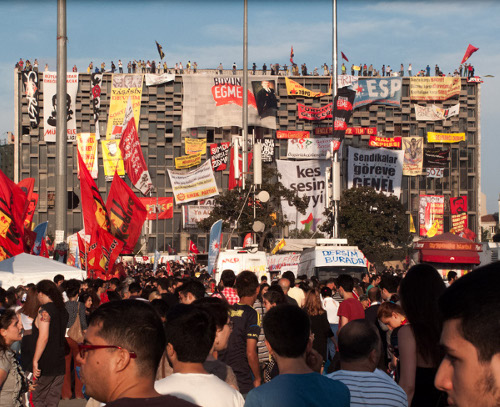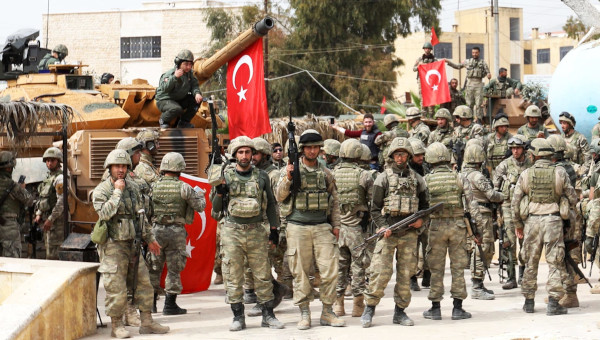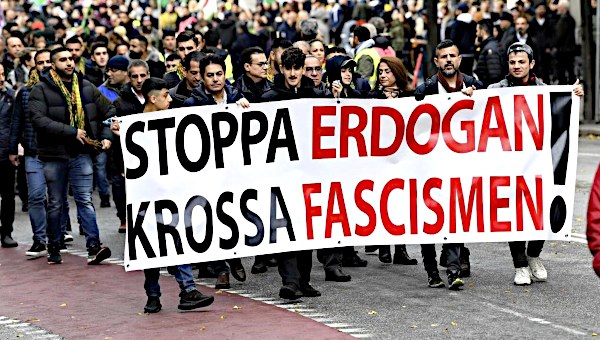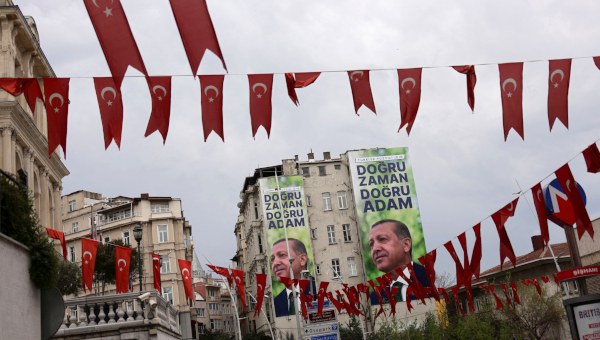A Balance Sheet of 15 Years
The AKP (Adalet ve Kalkınma Partisi-Justice and Development Party) is celebrating 15 years in power in Turkey. The party came to power in November 2002, against the backdrop of the major 2001 crisis and amidst a legitimacy crisis of the then mainstream political parties stemming from the crisis-ridden 1990s. The AKP’s policies brought about significant transformations in the state, economy and the society. Conventionally, the first two terms of the AKP government (2002-2011) were identified with democratization, reformism and progressive economic policies. The fact that the government’s authoritarianism reached inconceivable levels post-2011 (especially during and after the Gezi protests of 2013), and the fact that Turkey is governed under the state of emergency since the failed coup attempt of July 2016 [Ed.: see Bullet No. 1286] which resembles an ‘exceptional state’ form, have made conventional accounts to argue that Turkey is sliding toward ‘authoritarianism’. These accounts simply share the ‘good AKP goes bad’ view, and ‘class’ or ‘labour’ is absent in their analyses.

In distinction, I sustain the argument that, ‘neoliberal authoritarianism’ or ‘authoritarian neoliberalism’ marked the post-1980 military coup which aimed to remove labour as an agency from the political sphere, and in fact the AKP’s general economic and political stance reflected a continuity with this orientation. There is no doubt that there might be some type of a ‘qualitative’ shift in the form of authoritarianism post-2011 or post-coup attempt, however this is not a ‘deviation’ from neoliberalism and should be contextualized within the capitalist social relations of production and restructuring of capital-labour relations.
In this light, this piece attempts to critically review these 15 years from a labour-centred perspective and shed light on developments in labour market and labour movement. The topics are as follows: economic policy-making, the legal context of labour relations, unionism, unemployment, and indebtedness.
1. Economic Policy-Making
Neoliberal economic policy-making is anti-democratic; and constantly attempts to remove democratic and working-class participation from policy-making processes. The intellectual origins of this orientation go back to the diagnosis of the crisis of capitalism in the 1970s by neoliberals that the excess of democracy had weakened the ‘liberal’ resolve of the state and its authority (Bonefeld, 2017). Hence, under neoliberalism, state managers constantly attempted to insulate certain policies and institutional practices from popular dissent, which is an authoritarian tendency in itself (Bruff, 2014).
Economic and political developments in Turkey under neoliberalism reflect this tendency. However, the 2001 crisis, and the AKP’s take over of the power in 2002 amounted to the strengthening of these tendencies. Certain institutions were depoliticized and de-democratized through extra-democratic technocratic institutions (i.e. Central Bank, Independent Regulatory Institutions), and attempts were made to present certain policies ‘out of influence’ by introducing ‘binding rules’ (i.e. IMF agreements, debt ceilings, primary surplus targets, EU conditionality). The state of emergency in the last 16 months has strengthened this stance, and with the introduction of new institutions such as the Turkey Wealth Fund and the further decreasing role of parliament, policy-making is almost completely isolated from democratic interference.
2. Legal Framework of Labour Relations
Following a protracted demand from capitalist circles, the AKP introduced a new Labour Law in 2003 (Law No. 4857). This law introduced and institutionalized new forms of flexible employment and increased the control and disciplinary power of employers in the workplace, as well as reducing the extent of ‘job security’. It paved the way for further precarity, insecurity and de-unionization in the labour market whose political economic consequences will be dealt with later in this piece. In 2012, the AKP introduced a new Trade Union and Collective Bargaining Law (Law. No. 6356). Despite being presented as a ‘progressive’ step from the previous law by the government, it simply kept the post-1980 authoritarian union policy intact and did not bring about any progressive change to labour relations. Hence, the overall aim of the labour legislation in this era – reflecting the characteristic of authoritarian neoliberalism – was ‘individualizing labour laws and weakening collective bargaining processes and institutions’ (Clua-Losada and Ribera-Almandoz, 2017).
Aside from these major legal developments, the AKP government has also used omnibus bills to restructure labour relations in order to make labour more flexible and competitive. More recently, following the coup attempt, statutory government decrees are used for restructuring of state-capital-labour relations, which makes the management of labour power even more anti-democratic.
3. Trade Union Policy and the Condition of Unionism
As mentioned above, the AKP government took over the authoritarian neoliberal orientation of the Turkish state post-1980, which aimed to ‘put an end to class-based politics’ (Yalman, 2009). From the very beginning, the AKP’s trade union policy was authoritarian, even during the so-called ‘democratization’ era of 2002-2011. Hence, as de-unionization and weakening of collective bargaining power was a crucial aspect of this era; unionization levels decreased by 46% between 2001-2011, making Turkey the least unionized country in the OECD area, with union density in 2011 at just 5.4% (Çelik, 2015). The number of workers covered by collective agreements also decreased by 50% from 1990s to 2010s (Labour Ministry statistics), despite the number of workers at work having significantly increased. Currently, the union density is around 11% and membership rates appear to be on the rise. This, however, is due to the government’s corporatist union strategy which promotes unionism in AKP-friendly unions.
Another aspect of authoritarian union policy is strike bans and police violence toward workers’ protests. 13 strikes were ‘postponed’ or, more correctly, banned by the AKP government since 2002. Five of them occurred during the state of emergency following the July 2016 coup attempt. President Erdoğan himself declared that the government is making use of the state of emergency to ban strikes, in a speech made to the businessmen. During its rule, the AKP government has not hesitated to use police power in order to disperse workers’ resistances and occupations. Moreover, May Day celebrations in symbolic Taksim Square were banned between 2003-2008, and again after 2011.
4. Unemployment
Following the 2001 crisis, unemployment levels increased to double digits, and remained in double digits for the most of the AKP rule. Officially, unemployment currently stands at around 10-11% officially. Unions, however, argue that it is actually higher than the official rate. Also, youth unemployment is around 20%, which is alarming. The high unemployment rate is directly related to the AKP’s economic policies. Following the 2001 crisis, inflation targeting and achieving anti-inflationary credibility became the most important objective of the Turkish state managers, and therefore there was no meaningful employment strategy in place. Hence, the high growth years were actually amounting to what is known as ‘jobless growth’, depending on ‘hot money’ flows and financialization and exacerbated by AKP’s aggressive privatization policy. As the official unemployment rate increased to an alarming 16% in February 2009, the government took some measures. However, these were mostly aimed at making the labour market more flexible, as the government’s National Employment Strategy (NES-2014-2023) suggests. Unemployment remains as a significant problem for the current labour market in Turkey.
5. Rising Indebtedness of Workers
Turkish political economy witnessed a new development during the AKP rule: the rising indebtedness of households and/or shifting of the debt from the state to the households. Two elements played a significant role in this development. First, following the 2001 crisis, austerity policies meant that the government debt and deficit decreased, and the banks could not finance government deficits anymore. They had to find new ways (Karaçimen, 2014). Second, the condition of labourers deteriorated significantly in this period. Real wages decreased in manufacturing, and the minimum wage did not show any meaningful increase. Unemployment and precariousness increased significantly. These all paved the way for rising indebtedness of workers. Indeed, the ratio of household debt to disposable income was insignificant in 2003 (7%), but increased to 55% in 2013. Moreover, this trend rather affected the low-income households most, as 42% of the borrowers of consumer loans were people earning less than TL 1,000 per month (Karaçimen, 2014).
The AKP had to take some measures in 2013 to limit credit expansion, and these measures controlled rising indebtedness to some extent. However, following the economic contraction after the 2016 coup attempt, the government again had to rely on credit expansion for economic growth and household debt began to increase again. Overall, during this period, rising indebtedness added a new dimension to capital-labour relations in Turkey, and functioned as a disciplining mechanism.
Concluding Remarks
The 15 year AKP rule cannot be fully examined without taking the question of labour into account. This short paper attempts to do that. I argued that the AKP era represented a direct continuity with the post-1980 authoritarian management of labour power. Conventional accounts which identify earlier periods of the AKP with democratization, reform, and progressive economic policies fail to assess the anti-democratic and authoritarian neoliberal management of the economy and labour relations. In this context, any democratic struggle against the current authoritarian/exceptional state form should prioritize the issue of class, specifically labour, in order to achieve democratic outcomes. •





